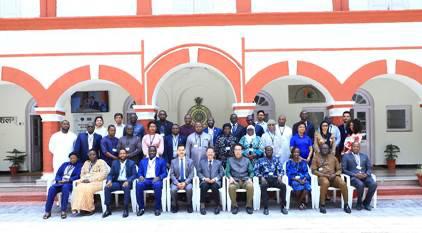By: Alieu Jallow
Thirty Senior Officers, including Deputy Permanent Secretaries and Directors, are attending a two-week Career Training Program in India. The program is part of the government’s initiative to enhance the skills and knowledge of senior officials in fostering socio-economic development as the nation strives to achieve the 2023-2027 National Development Plan “Yiriwa”.
Speaking during the opening ceremony, Lamin K. Saidy, Deputy Youth Adviser and Head of Delegation of the 4th Mid-Career Training Program for Mid-Level Civil Servants of The Gambia in Dahradun, India, underscored the significance of capacity development, which he noted is central in the National Development Plan of The Gambia (‘YIRWA’). Thus, as representatives of The Gambia, they recognize the critical primacy of effective governance and sound public policies in fostering sustainable development and ensuring the well-being of their citizens.
Mr. Saidy highlighted that the training program is part of their quest to enhance governance structures and administrative practices. Hence, they will seize the opportunity to learn from the experiences and expertise of the Indian Government.
“India’s remarkable journey in building robust digital infrastructure and leveraging technology for public service delivery serves as a beacon of inspiration for nations around the globe, including The Gambia. Throughout this training, we are eager to learn from the wealth of knowledge and experiences shared by our Indian counterparts. We seek to explore innovative strategies, best practices, and lessons learned that we can adapt and implement within our national context to strengthen our governance structures and improve service delivery for our citizens,” he outlined.
Similarly, the Deputy Presidential Youth Adviser expounded on the government’s recognition of harnessing the power of digital technology and innovative leadership to drive progress and development in The Gambia, stressing that in an increasingly interconnected world, digital public infrastructure has emerged as a cornerstone for effective governance, citizen engagement, and service delivery.
The Deputy Youth Adviser seized the opportunity to express gratitude to the country’s head of state, whom he described as dynamic and visionary in creating such opportunities.
“I want to seize this opportunity to thank the President of the Republic of The Gambia for his foresight in transforming public institutions to be more effective and efficient. I extend thanks and appreciation to the staff of the Personnel Management Office for their guidance throughout the preparatory process.”
In his inaugural address, Shri V. Srinivas, Director-General of the National Centre for Good Governance (NCGG) and Secretary of the Department of Administrative Reforms and Public Grievances (DARPG), welcomed the participants and similarly highlighted the transformative Indian governance model, which has evolved significantly from 2014 to 2024.
“The new paradigm emphasizes transparency, efficiency, and effectiveness, driven by technological advancements that have notably impacted India’s rural areas and bridged the digital divide, underscoring the importance of digital literacy for both government officials and citizens to streamline governance processes,” he stated.
The Gambia and India have long-standing relations, with the government leveraging the bilateral relationships the two nations share. The officials believe that this reflects President Barrow’s dynamic leadership in advancing the cause of good governance, digital transformation, and effective public administration.




